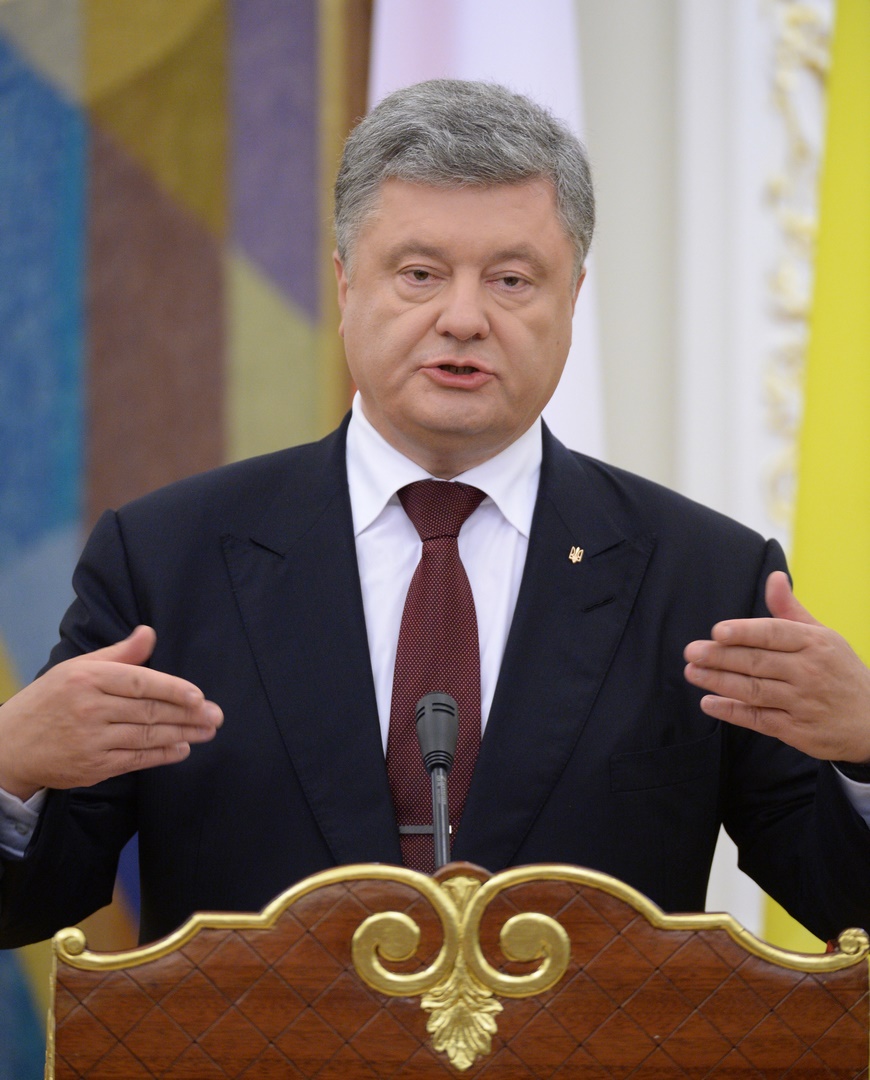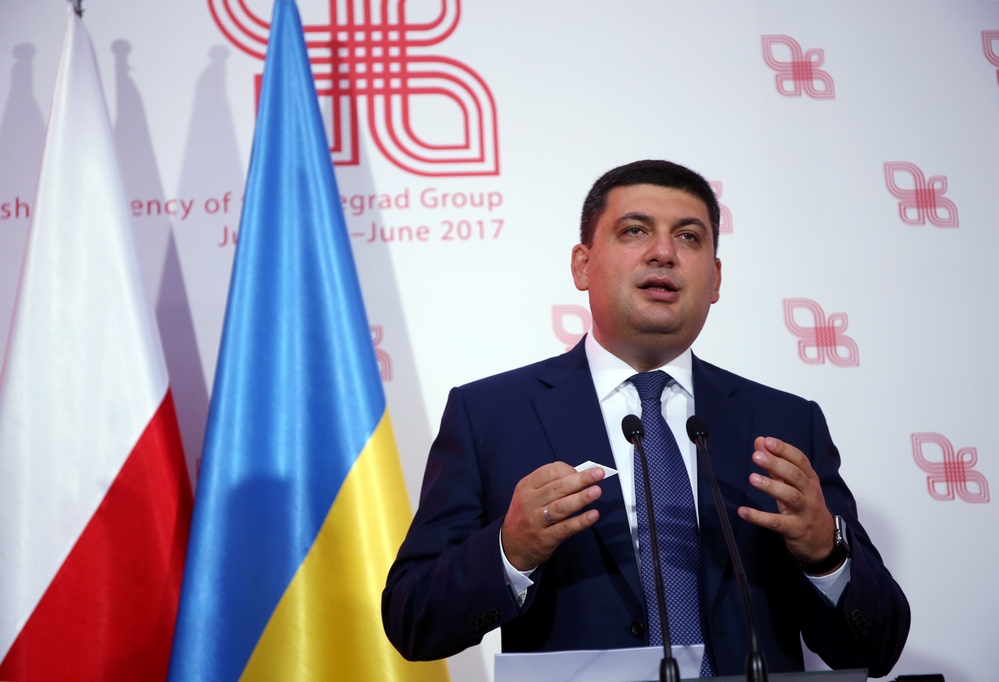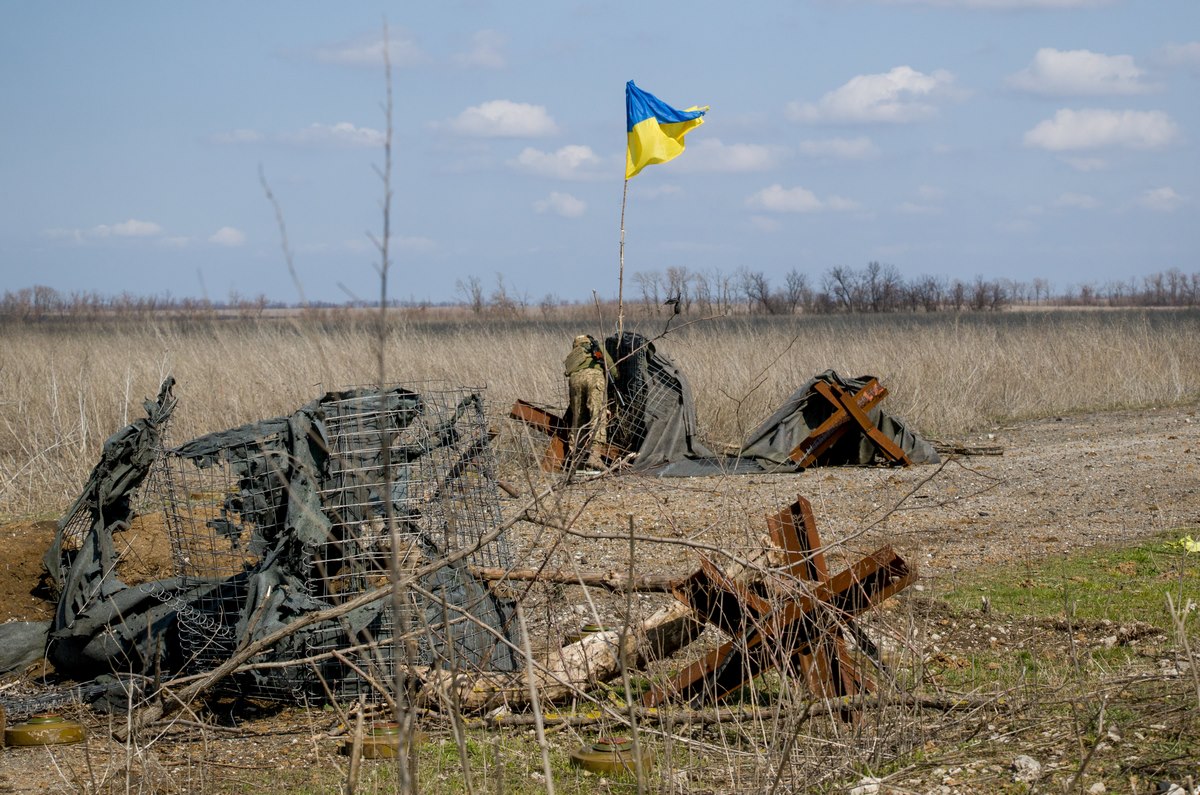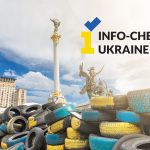THE WARSAW INSTITUTE REVIEW
Date: 21 May 2017 Author: Jan Gajewski
Ukraine 2018
Political life in Ukraine in the coming months will be determined by the election calendar and the international situation, and above all Russia’s relations with the West. In 2019, presidential elections (March) and parliamentary elections (October) should take place. The preparations for both of these events will determine political life in Ukraine in 2018, and will also affect the attitude of politicians in Kiev towards the conflict with Russia.

According to public polling, Ukraine’s biggest problems, in the eyes of its people, are: the conflict in Donbas, the economic and social policy of the government and corruption. In preparing for the re-election battle, the chief player, President Petro Poroshenko, will continue trying to skillfully play for time on the Donbas issue (delaying the implementation of the 2015 Minsk Protocol) , which is beneficial for Ukraine. The problem is that Poroshenko is behaving the same way regarding another matter, namely the fight against corruption. His evasions and delays on this issue not only harm the country, but also won’t help him in the election fight, which does not mean that he has no chance of winning. The problems in Ukraine today revolve around the absence of reliable leaders — there is little indication that this will change in the foreseeable future.
Conflict with Russia
The main external factor affecting all areas of Ukrainian life remains the conflict with Russia, in all its aspects, from the proxy war in Donbas, to the question of who Crimea belongs to, to gas and energy issues and more broadly, the economy. Conflict with Russia does not leave Ukraine with many geopolitical choices: we should expect further steps drawing Kiev closer with the West (EU, NATO). This is all the more so, since already two-thirds of the population support Ukraine’s membership in the North Atlantic Alliance, while support for entry into the EU is not far behind. Paradoxically, the war in Donbas, which increasingly binds Ukrainians to Europe, is also the biggest obstacle to integration. It’s also known that without the involvement of other countries, it won’t be possible to settle the problem of Donbas and Crimea. Political forecasts, both in terms of the West and Russia, however, indicate that a breakthrough is not to be expected in the near future. Each of the participants in the Minsk process has their own internal political problems, sufficiently important to the point that no one will push for a turning point in the crawling – basically stagnant – process of implementing the February 2015 Minsk agreement. And this situation suits the authorities in Kiev, who are blocking the implementation of the Minsk points — because it would mean ; hence, for example, the long delayed adoption by the parliament of a law giving the occupied territories autonomous status.
In the current domestic and international situation, the status quo seems to be the optimal situation for Ukraine, and even more so for the political team currently in power. The past three years have shown that the loss of Crimea and a large part of the Donbas by Ukraine has dealt a powerful blow to pro-Russian politics in the country. It’s not just a matter of compromising the overt behavior by Ukrainian politicians acting as allies of a neighboring country, with whom a de facto war is taking place. The Moscow camp on the Dnieper also lost most of its electorate that remained on the other side of the front. Today, the Kremlin has very limited options for influencing the decisions of Kiev “from the inside”. Besides, this is not the only advantage of the present situation. It is now on Russia, and not Ukraine, to ensure the economic survival of Donbas. It is true that support for a forcible solution to the problem is growing (the Ukrainian army is incomparably stronger today than in 2014 or 2015), but Kiev is aware that an attack would probably end with a Russian intervention, and above all, it would mean a loss of support for Ukraine from the West. So it remains for them to wait for more favorable circumstances, and until then, only periodically escalate the conflict in times politically favorable for Ukraine (Russia does this as well), if only as a pretext to postpone the implementation of the Minsk agreement.
Such a play for time also carries risks — more and more Ukrainians see that war is used by a large part of the political class (especially the rulers) and the oligarchs as a pretext to abandon or slow down reform. What’s more, accusations are starting to sprout up that many of whom derive political and financial benefits from the current stalemate. It can be expected that there will be increased pressure to solve the problem — in the direction of intensifying Kiev’s policy and there are signs of this already. For instance, in March, Poroshenko decided to formally recognize the grassroots blockade by veterans and nationalists of trade with the occupied territories, which has been taking place since January. A lack of resolution will cause more and more dissatisfaction, because it has a direct negative impact on the economy and people’s everyday lives. Over a period of three years after the outbreak of the conflict, very few buy the argument that changes are slow, or on hold, because of the war. The difficult external situation and social mobilization around the war in Donbas should be a catalyst for reform. In situations of bloodshed and patriotic outbursts, it should be easier to make the painful albeit necessary changes. But the oligarchs and political class don’t care for such changes. The promise of “de-oligarching” remains unfulfilled, similar to the fight against corruption. It’s no wonder that only 27% of Ukrainians today see a political leader who can be trusted in the country. By contrast, 62% believe that the country needs new leaders, and 70% do not trust the current political class — this is a potentially huge electorate to be by new politicians. This does not imply major changes but rather the triumph of disappointment, apathy, and the turning away from politics and public life. Only 38% of Ukrainians believe in a new Maidan, and only 20% are ready to participate in demonstrations.
The President’s Camp
One of the biggest disappointments for the political supporters of Maidan is the attitude of Petro Poroshenko — although it shouldn’t be, because when the Ukrainians elected him as president, they knew his past (characterized by, to put it gently, great political flexibility, which was reflected in his cooperation with both Viktor Yushchenko, and then with Viktor Yanukovych) and knew that he was one of the oligarchs. It’s hard to recognize Poroshenko as a radical reformer. Despite favorable conditions (mobilization around the war with Russia) he did not opt for profound changes in the state (an example being the weak fight against corruption and deal-making with other oligarchs), but rather settled for consolidating his position, raising the specter of defeat in the conflict with Russia and the return to power of the pro-Moscow camp on one hand, and radical nationalists on the other. At present, Poroshenko definitely dominates in Ukrainian politics, having not only a strong presidential administration, but also controlling the parliament, with a malleable prime minister, and controlling the prosecutor’s office and the security services. Poroshenko will play the lead role in the next two years. With the weakening of coalition partners, especially the People’s Front (who lost the post of prime minister) and the lack of sufficient attractiveness of the current opposition to the electorate (the majority of the parties and its leaders having compromised themselves earlier when in power), it is expected that Poroshenko will strive to further strengthen his influence due to the upcoming presidential elections. Given the poor ratings, his election for a second term will require ideas and effort comparable only to the re-election of Boris Yeltsin in Russia in 1996. The president’s actions will be focused towards the 2019 elections, as will the activities of most other state agencies. It will be in Poroshenko’s interest to maintain the status quo, i.e. to prevent the emergence of new and significant political centers in the country. The president will oppose the dissolution of the parliament, and even more so will be against a change of government. He will not take any risky steps, even in the area of reform.

We should assume that Poroshenko will want to use the head of government as a buffer even more now. Volodymyr Groysman is an obedient executor of the president’s instructions. In fact, the president will continue to use his broad The presidential administration will remain the actual center for administering the most important areas of the state. Meanwhile, the government and the divided parliament remain marginalized in this situation.
Groysman is a trusted colleague of Poroshenko, but his role as head of government allows him to build his own position. His main task was to stabilize the socio-economic situation last year and he dealt with that challenge. Despite the fact that he appears suitable, in the eyes of the West as well, Groysman has declared that he has no presidential ambitions. This is very important as it reduces any possible tension in the relationship between the two politicians and signals their even closer cooperation, which will probably take the form, at a certain point, where the head of government will be supporting the presidential campaign through his politics. Groysman’s position is strengthened in that the present shape of the parliament will not allow for the emergence of a new prime minister. This would mean early elections, and the majority of deputies don’t want this. No party or bloc of parties can count on a definitive success. Polling indicates that in the present situation the new Verkhovna Rada (parliament of Ukraine) would be even more fragmented than the present one. The five percent threshold is crossed by Batkivshchyna (11%), Petro Poroshenko Bloc “Solidarity” (9%), and Opposition Bloc (9%). A few other parties have somewhat less support, and the popularity of the People’s Front, which won the previous election, has evaporated (currently it only has 1–2% support in the polls). The purpose of the Front is to survive in the hope of rebuilding the confidence of voters before the 2019 elections, which is why it remains in the coalition.
The real leader of the People’s Front is the Minister of Internal Affairs Arsen Avakov, who seems to be one of the potential rivals to Poroshenko. He took over the ministry right after the Maidan revolution, then as a representative of the People’s Front and has remained in office — which testifies to his strength — even after the change of government. Out of the spotlight, he is building his own position as a strong candidate for the presidency. All the more so, that he is considered the leader of the “war party” and can get the support of veterans as the man who put in the greatest effort for the country during the first phase of the war. He sees Poroshenko and Groysman as his competitors; , and makes use of nationalist and Donbas veteran groups. The effectiveness of this tool is shown by events that took place in the first months of this year. The grassroots trade blockades against the occupied Donbas or the campaign against Russian banks in Ukraine, finally forced the government to adopt and implement many of these radical demands. The internal affairs minister has been subject to increasing criticism, scandals and more serious cases involving the use of firearms — and yet Avakov’s position seems stable. His dismissal could destroy the coalition government, especially since the Front itself has no one of Avakov’s caliber in the government that could replace him. Interestingly, the situation isn’t being taken advantage of by the opposition, especially Yulia Tymoshenko, whose Batkivshchyna leads in the polls. This can be explained by Avakov’s past — up until 2014 he was one of the leading activists in Tymoshenko’s party, and may still have information that would
The presidential camp is aware of the danger posed by Avakov’s activation of nationalists and veterans of the Donbas. This is a factor that could totally destabilize the country. It’s no accident that Groysman harshly criticized the veterans’ blockade of the Donbas, saying it was in Russia’s interest. However, Avakov won this battle. The interior minister holds a strong card in the form of former fighters against the Russians and rebels, members of the volunteer battalions. These battalions played an important role in the first phase of combat when the regular army and other official armed forces had been routed. Then, gradually, these volunteer troops were absorbed by the National Guard of the Ministry of Internal Affairs and the land forces of the army. The former volunteer battalions that now make up the National Guard units signal their loyalty to Avakov. In addition, he tolerates the independence of the Right Sector Voluntary Corps. Based on his reputation from the Donbas war period and his indulgence of the radicals, Avakov may decide to run for president under the banner of the “war party” and nationalist slogans. And he, not Yulia Tymoshenko, would be the mostrival for Poroshenko. The former prime minister has rebuilt part of her past political position, herself winning support similar to Poroshenko, while her party the president’s coalition in the polls. Tymoshenko may well have the ambition of becoming the informal leader of the entire opposition. Much will depend, however, on the opinion of Moscow and some Ukrainian oligarchs. The former is important in the context of possible support for Tymoshenko by the inheritors of the Party of Regions and generally the entire pro-Russian electorate, whereas the latter is necessary for financial reasons. Most important will be the attitude of Ihor Kolomoyskyi, who has already been both in a serious conflict and then friends with Poroshenko. It is worth remembering that he once supported Tymoshenko, when very few did. The president also knows that an open conflict with Kolomoyskyi could cost him dearly. Therefore, we will probably witness the efforts of various political forces vying for the favor of the oligarch, which will only strengthen him — both politically and in business. In any case, he already has a debt of gratitude from the ruling class. When there was a crisis within the coalition, and in February 2016 when Batkivshchyna and Self Reliance left it, the deputies controlled by Kolomoyskyi cast the necessary votes to appoint the government of Groysman.
Kolomoyskyi belongs to the “old oligarchs”, for whom, in post-Maidan Ukraine, the situation is no worse than before 2014, despite one of the main demands of the bloodied Kiev street protesters being to limit the influence of big business on the state. The problem is that the president himself is an oligarch and that under his rule the government has not only reached out to the old oligarchs but has also developed relationships with new ones. The power of big business is due to the weakness of the state (systemic corruption, lack of independent courts, politicization of law enforcement agencies, ineffective management). A tactical alliance of the new rulers with oligarchs is beneficial for both sides. The government has gained the support of deputies from oligarch-controlled groups in the parliament, unofficial sources of funding and media support — especially important before the elections. In return, the oligarchs were given a guarantee of personal security, protection of their interests and the possibility to continue lobbying. This silent arrangement explains the withdrawal of the new authorities from declaring the revision of many forms of privatizations which took place under Yanukovych. The president’s control over the Prosecutor General’s Office makes it possible to effectively torpedo certain uncomfortable investigations. A symbol of the untouchability of the oligarchs were the governments under Prosecutor General Viktor Szochin, who was replaced by Yuriy Lutsenko — also Poroshenko’s man. Not much has changed, as the prosecutor’s office remains a tool of the president, which means, for example, blocking any real fight against corruption.
Institutional and legislative conflicts related to this problem will have a negative impact on the situation in Ukraine. Moreover, before the election, one can expect a rash of information to appear compromising individual participants in their political lives. This could have prompted Poroshenko to sign the March 27 amendments to the law, in which anti-corruption activists are compelled to submit declarations of property, as politicians and state officials do. It is a weapon against investigative journalists who regularly disclose corruption — most of whom are financially supported and otherwise by non-governmental organizations (it is formulated in such a way as to force people to disclose property if they have anything to do with organizations covered by the law). The fight against corruption will face the resistance of bureaucrats and public officials, for whom “unofficial” material gain is something natural and a privilege they do not intend to give up. The authorities can always boast of the creation of the National Anti-Corruption Bureau (NABU) in April 2015 and the launch of an electronic declaration of assets system for politicians and officials in October 2016. But the tendency to tie the hands of the NABU can already be seen, which was created mainly under U.S. pressure. The head of the National Anti-Corruption Bureau was given his position to ensure his independence. Dismissal is only possible due to negative results of an audit, which is carried out by three people, designated respectively by the president, the government and the parliament. A problem is that the authorities are blocking the establishment of the Anticorruption Court; however, the biggest obstacle to the effective functioning of the NABU is obstruction by the Security Service of Ukraine (SBU), above all of the prosecutor general and courts. Many investigations are left incomplete, and the conflict between the NABU and the prosecutor’s office and SBU can be expected to grow.

Reforms
When it comes to reforms, their implementation and pace of which, and the fight against corruption with the current political system in Ukraine, the only chance for these to be successful will be with the continuation of external pressure, firstly from the United States and the International Monetary Fund. Taking into account the political perspectives and views of the current U.S. administration, it is expected that Washington will no longer be so active in urging Kiev to reform. The situation is different with the IMF. One of the most important tasks of the Groysman government in the near future will be to maintain good cooperation with the Fund. Despite differences and certain tensions, the IMF continues to give Ukraine successive loans which began under Yatsenyuk in 2015. The Fund has praised Groysman, chiefly for macroeconomic stabilization. The main achievement of this government has been the restoration of economic growth. While this is modest at only 2%, it is important that the downward trend, observed in 2014–2015, has been broken. In 2016, the Ukrainian economy returned to the path of growth after two years of decline (7% in 2014 and 12% in 2015) and in 2017 it is expected to grow by more than 2–2.5% according to various estimates and by 3–3.5% in 2018. Due to the restrictive monetary policy of the National Bank of Ukraine, inflation has fallen from 61% in April 2015 to 12% in spring 2017. However, a risk to the slowly rising Ukrainian economy will be social welfare spending — the closer the election, the larger it will grow. Groysman has already announced an increase in benefits for 5.6 million pensioners beginning on October 1, 2017, presenting it as a step towards modernizing the pension system. The problem is that this modernization is seen completely differently by the IMF. From the Fund’s side, pressure will increase on Kiev on two issues. First of all is pension reform, which means increasing the retirement age. Secondly, to give the green light for the sale of land (a moratorium imposed in the early 1990s is still in force). Meeting these two expectations may prove unrealistic. Such serious reforms given the state of the present coalition are unlikely. While there is a majority in the parliament, there is not a majority supporting the government, but rather who support the continuance of the current parliament until the end of the term.
In summary, it is difficult to expect a breakthrough in Ukraine in the next two years, both in external and, most of all, internal politics. With regard to the former, there remains an element of uncertainty associated with Russia’s policy (speculation of a possible escalation of the conflict in the fall of this year, although it is doubtful that Putin will decide on large-scale actions, not knowing their effects on the 2018 elections), while in the latter everything speaks of stagnation. Above all are the interests of Petro Poroshenko, but also the fears of most of the political class about early elections, as well as the calculations of oligarchs satisfied with the current state of affairs.
All texts published by the Warsaw Institute Foundation may be disseminated on the condition that their origin is credited. Images may not be used without permission.










